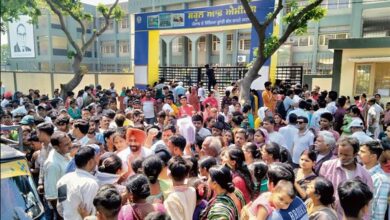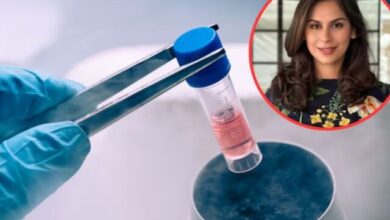YogMantra | The Unification of Yoga, Sports, and Science
How do sports and yoga relate to each other? A three-day international conference held earlier this month by S-VYASA Yoga University seems to have been the subject of many discussions.

The 2024 edition of INCOFYRA (International Conference on Frontiers in Yoga Research and its Applications), with the theme “Integrative Sports Medicine and Rehabilitation,” included topics pertaining to all-encompassing and long-lasting medical treatment for athletes and sportspeople. It brought together academics, researchers, and practitioners from all around the world to investigate the connections between sports medicine, yoga, and rehabilitation.
For more than 20 years, S-VYASA University’s premier event, INCOFYRA, has served as a forum for essential scientists and clinicians to share the most recent findings from their research.
“We think that sustained international cooperation across interdisciplinary fields will advance sports medicine. Physical therapists, integrative and conventional medicine-based sports rehabilitators, athletic trainers, primary care doctors, and researchers with an interest in sports-medicine science, diagnosis, and treatment were the target audience for the 25th INCOFYRA. The primary sponsor of the conference and founder-chancellor of S-VYASA University in Bengaluru, Dr. HR Nagendra, said that the conference’s goal was to maximize athlete care by achieving high levels of confidence and competence in these domains.
YOGA IN ADDITION TO PHYSIOTHERAPY PRODUCED BETTER RESULTS THAN PHYSIOTHERAPY ALONE
Sports medicine has expanded significantly thanks in large part to the growing popularity of exercise and sports.
Sports medicine and rehabilitation have traditionally included medical and surgical procedures, followed by physical therapy, strength training, and nutritional supplements. Global trends, however, are shifting more and more in favor of incorporating traditional ways, and athletes often demand this.
Vice-Chancellor of S-VYASA University Dr. BR Ramakrishna provides confirmation. The body of research supporting integrative treatment is growing, and athletes and sports-medicine professionals are beginning to embrace it more and more. It has been discovered that the native healthcare system is very successful in treating a number of chronic illnesses, guaranteeing athletes’ fitness, and recovering from sports-related injuries.
According to NK Manjunath, Director of Research at S-VYASA University, “a systematic integration of complementary medicine with conventional methods is an unmet need to attain optimal performance, sports-related injury prevention, and effective functional rehabilitation of sports personnel.”
Growing evidence points to the advantages of including yoga into recovery regimens. Yoga is a traditional Indian mind-body healing therapy that incorporates physical postures, controlled breathing, meditation, and relaxation methods. When combined with physiotherapy, yoga demonstrated superior results for controlling pain, stiffness, and functional subscales of the WOMAC scale than did physiotherapy alone, he discloses.
IMPROVED “EVIDENCE BASE” OF TRADITIONAL MEDICINE: INDIA AS A LEADER
“How a British long jumper embraced yoga and never looked back” is an intriguing feature story from the World Health Organization (WHO) newsroom. It discusses how “athletes’ workout plans are increasingly incorporating slow, measured movements like the practice of yoga,” whether in recovery or as a preventive measure against injuries.
Nevertheless, the WHO stresses the need to “strengthen the evidence base on yoga, and show, in a systematic and standardised way, how it contributes to physical and mental health,” even though it acknowledges that yoga and other traditional medicine systems are “an important and often underestimated health resource.”
In order to achieve this, WHO organized a Global Summit on Traditional Medicine for August 2023 and established the “Global Centre for Traditional Medicine” in Jamnagar, Gujarat, with assistance from the Indian government.
The 25th INCOFYRA’s evidence-based scientific workshops, best practices, and idea exchange are useful in this situation. This conference advances the cause of athletes’ health while also introducing the critical component of research and claims in complementary medicines that are supported by data.
Nine keynote addresses, 27 symposium lectures, many seminars, and scientific sessions with evidence-based insights were all included during the event. 600 delegates and 55 national and foreign specialists took part in it. Prominent individuals, foremost among them ICCR President Dr. Vijay Sahasrabuddhe, were invited as guests, along with athletes and champions.
Additionally, a number of distinguished individuals and policy stakeholders took part in a special roundtable discussion on “Challenges in Integrative Rehabilitation and Policy-Making in Integrative Sports Medicine.”
Ideas for enhancing the relationship between the mind, body, soul, glutes, biomechanics, and data science
Future athletes may improve their core muscles, calf, glutes, and chest by practicing yoga asana and pranayama. The Indian basketball coach Srinivasa Murthy
Sports performance and biomechanics: how comprehending the human body’s mechanics may lead to unprecedented athletic success – Mark Arthur King, Loughborough University’s Sports Biomechanics Professor
developments in diet and sports nutrition. The significance of diet for an athlete’s performance, stamina, and recuperation – Prominent sports nutritionist Geetha Ghaliyavar
The focus on inner happiness and physical health in the National Education Policy 2020, according to Dr. Ganesan Kannabiran, Director of NAAC in Bengaluru
The use of data analytics and yoga therapy to enhance sports medicine and other therapies Sports psychologist Chieko Kato works at Toyo University in Japan.
A methodical approach to incorporating yoga into sports rehabilitation – Manjunath NK, S-VYASA University’s Director of Research
Chief Executive Officer and Scientific Director of DBSS International, Colombia Diego Bonilla discusses the important idea of allostatic load with a variety of domain-specific biomarkers from the viewpoint of athletes.
Current developments in sports medicine and arthroscopy expert Thiagarajan Alwar, MD
Dr. Jagadeesh PC, an orthopaedic surgeon with expertise in sports, uses conservative procedures in meniscus surgery.
Integrating yoga into sports medicine and rehabilitation may improve athletic performance, according to Dr. Dobson Dominic, MD (Sports Medicine), Chennai







